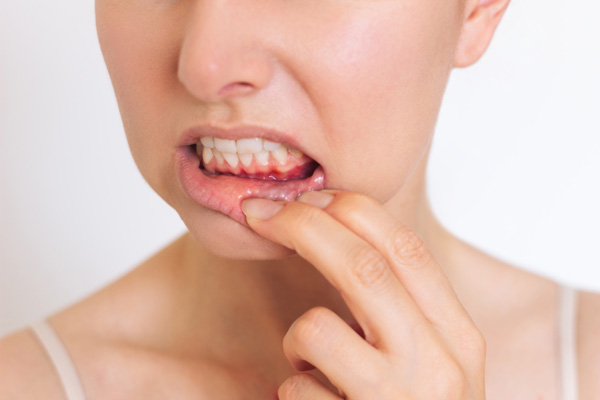Are Bleeding Gums a Sign of Gum Disease?

Most people have experienced seeing red on the bristles of their toothbrush, or a pink tint in the sink when they expectorate after brushing. It is normal to feel a bit of concern when noticing blood in the mouth because bleeding gums are a symptom commonly associated with gum disease. However, while chronic bleeding gums can be a cause for concern, it is normal for the gums to bleed now and then. Below is a breakdown of possible causes of bleeding gums as well as more information about gum disease.
What is gum disease?
One of the most serious causes of bleeding gums is gum disease, which occurs when plaque stays too long on the gum lines. To determine if this is the cause of the discomfort, it can be helpful to understand a little more about what gum disease is. Gum disease, or periodontal disease, is a bacterial infection in the gums. In the early stages, it is called gingivitis, which is an accumulation of hardened tartar near the gum line, which can cause swelling, irritation, and discomfort in the mouth and around the gums. Over time gingivitis can develop into a more serious case of periodontitis, an infection of the jawbone, gums, and the mouth's connective tissues. Periodontitis can be serious and painful, causing gum recession and even tooth loss if left untreated. Other symptoms of gum disease include pain and swelling along the gumline. Over time, affected patients may notice symptoms becoming more extreme. The gums may eventually begin to pull back from the teeth, making them appear longer. Early treatment is key to preventing gum disease from getting worse.
Other causes of bleeding gums
While gum disease is one potential reason that gums may bleed, there are other possible causes to be aware of. Occasionally, gums may simply become irritated, leading to bleeding here and there. This may happen after flossing the teeth overly aggressively or brushing too harshly. If a patient switches to a toothbrush that is too hard for their teeth, bleeding may happen frequently after brushing. Dentures or other restorations for the teeth that were not placed correctly can also lead to irritation in the gums. Certain health conditions, including bleeding disorders, can contribute to bleeding gums. Hormonal changes during pregnancy can result in bleeding gums. Certain blood-thinning medicines like aspirin, heparin, and warfarin can also cause gums to bleed. In less common cases, vitamin deficiencies may be the root cause of sensitive gums. Vitamins C and K can both be helpful in promoting healthy gums. Foods such as broccoli, brussels sprouts, and dark, leafy greens are rich in both of these vitamins and can easily be added to a healthy diet.
When to see a dentist
If the bleeding in the gums is more sporadic and does not happen often, it can be discussed with a dentist during a routine appointment. If a patient has noticed gum pain and bleeding frequently, it is advisable to schedule an appointment to get these symptoms looked at. Gum disease is most easily treated when it is caught early on. While it can be treated at all stages, treatments for more serious periodontitis are more invasive. Serious damage from prolonged periodontitis, such as lost teeth, may cause permanent changes to the mouth if left unaddressed.
How to treat bleeding gums
The first step to healthy gums is practicing good dental hygiene. Brushing and flossing frequently with proper technique will prevent plaque from forming at the gum line and reduce the risk of gingivitis. Antiseptic mouthwash is another tool for minimizing plaque. A salt water rinse is an easy way to soothe swollen gums that tend to bleed. A soft-bristled toothbrush is helpful for delicate gums that may experience bleeding after brushing. An electric toothbrush is another useful tool, as the specially designed heads on the toothbrushes are tailored to gently reach the gum line and will often be less abrasive than a traditional toothbrush.
Conclusion
Proper oral hygiene and regular appointments with a dentist can both help prevent gum disease and ensure that if it does begin to develop, it can be treated before it becomes serious. Gingivitis or periodontitis may the underlying reason for gums to frequently hurt, feel swollen, and bleed often. A dentist can detect early signs of gum disease and advise patients on the right course of action to restore the teeth to a healthy state. If the bleeding is less frequent, only occurring once in a while, it is likely nothing serious.
Request an appointment here: https://dentistryonpark.com or call Dentistry on Park, LLC at (781) 443-8131 for an appointment in our Stoughton office.
Check out what others are saying about our dental services on Yelp: Gum Disease in Stoughton, MA.
Recent Posts
Gum disease starts with the growth of bacteria in the mouth. When brushing or flossing does not remove this bacteria, harmful plaque accumulates and hardens into tartar. The collection of tartar along the gum line results in gingivitis, which can worsen into periodontal disease. Symptoms of this disease can be mild in the early stages,…
Gum disease is also known as periodontal disease. This is a condition that causes inflammation of the tissue around the patient’s teeth. It is caused by bacteria building up in the area. Keep reading to learn about some of the symptoms of this condition.Periodontal disease is a progressive condition, meaning it gets worse over time.…
Routine dental checkups often include preventive measures that go beyond cleaning teeth. An example is the oral cancer screening. General dentists recommend these screenings to detect early signs of oral cancer, which can significantly improve treatment outcomes. Understanding the role of oral cancer screenings and what to expect during them can help you decide whether…
Oral cancer screenings are a simple yet essential procedure that helps dentists look for signs of cancer in your mouth and throat. This quick and painless examination can catch signs of oral cancer in its early stages. If you have an upcoming oral cancer screening, here is what you can expect from the process.An oral…


